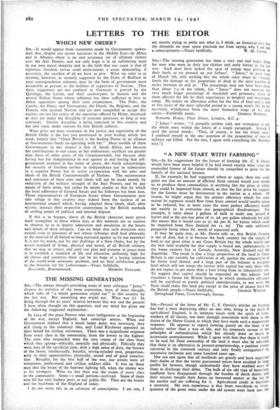LETTERS TO THE EDITOR
WHICH NEW ORDER?
Sts,—It would appear from statements made by Government spokes- men that, despite our recent successes in the Middle East—in Africa and in Albania—there is no real assurance yet of ultimate victory over the Axis Powers, and our only hope is in an unfaltering trust in our own moral integrity and in the faith that our cause is that of righteous freedom versus cruel enslavement, a cause demanding, if necessary, the sacrifice of all we have to give. What we refer to as tyranny, however, as recently suggested by the Duke of Bedford in your correspondence columns, may be the form of government most acceptable at present to the millions of supporters of Nazism. That these supporters are not confined to Germany is proved by the Quislings, the Lavals, and their counterparts in Austria and the several Balkan States whose influence has been sufficient at least to defeat opponents among their own countrymen. The Poles, the Czechs, the Danes and Norwegians, the Dutch, the Belgians, and the French, who resisted Nazism and are now compelled to accept this regime, are not fair critics of the amenities offered by Hitler, inasmuch as they are under the discipline of restraint necessary so long as war continues. Similar discipline is being exercised in this country and has also come under censure by free British subjects.
What gives me most assurance in the justice and superiority of the British Order is the fact you mentioned in your leading article last week, namely that " Great Britain is the leading Power in an alliance of Governments freely co-operating with her." Most notable of these Governments in this respect is that of South Africa, not because her contributions to our cause, or her enthusiastic sacrifices are greater than those of other parts of the Commonwealth, but because after having lost her independence in war against us and having had self- government restored in her terms of peace, she freely acknowledges her security of freedom neither in independence nor in submission to a superior Power but in active co-operation with the aims and ideals of the British Commonwealth of Nations. The maintenance and extension of these aims and ideals will not be made merely by reduction of the military strength of the Axis Powers, nor by any means of force alone, but rather by means similar to that by which the loyal adherence of General Smuts and his followers has been won. Those representatives of European States whose Governments now take refuge in this country may indeed form the nucleus of an international council which, having adopted these -ideals, shall, after victory, instruct their respective countrymen in the British methods of settling points of political and internal dispute.
If this is to happen, above all the British character must prove itself exemplary to those whose eyes at this moment are so curious to observe, so as to inspire admiration and emulation in the hearts and minds of these refugees. Can we hope. that such attraction may extend even to prisoners of war whose influence shall lead ultimately to the removal of all hatred so long nurtured against us by our enemies? It is not by words, nor by any draftings of a New Order, but by the actual standard of living, physical and moral, of all British citizens, that we may so attract, and until our plan and purpose in peace-time is to establish a standard of life and education uniformly high for all classes and countries there can be no hope of a lasting solution of the world-wide economic problem, and no final satisfaction given to the feverish cry for Lebensraum.—Yours faithfully,






























 Previous page
Previous page